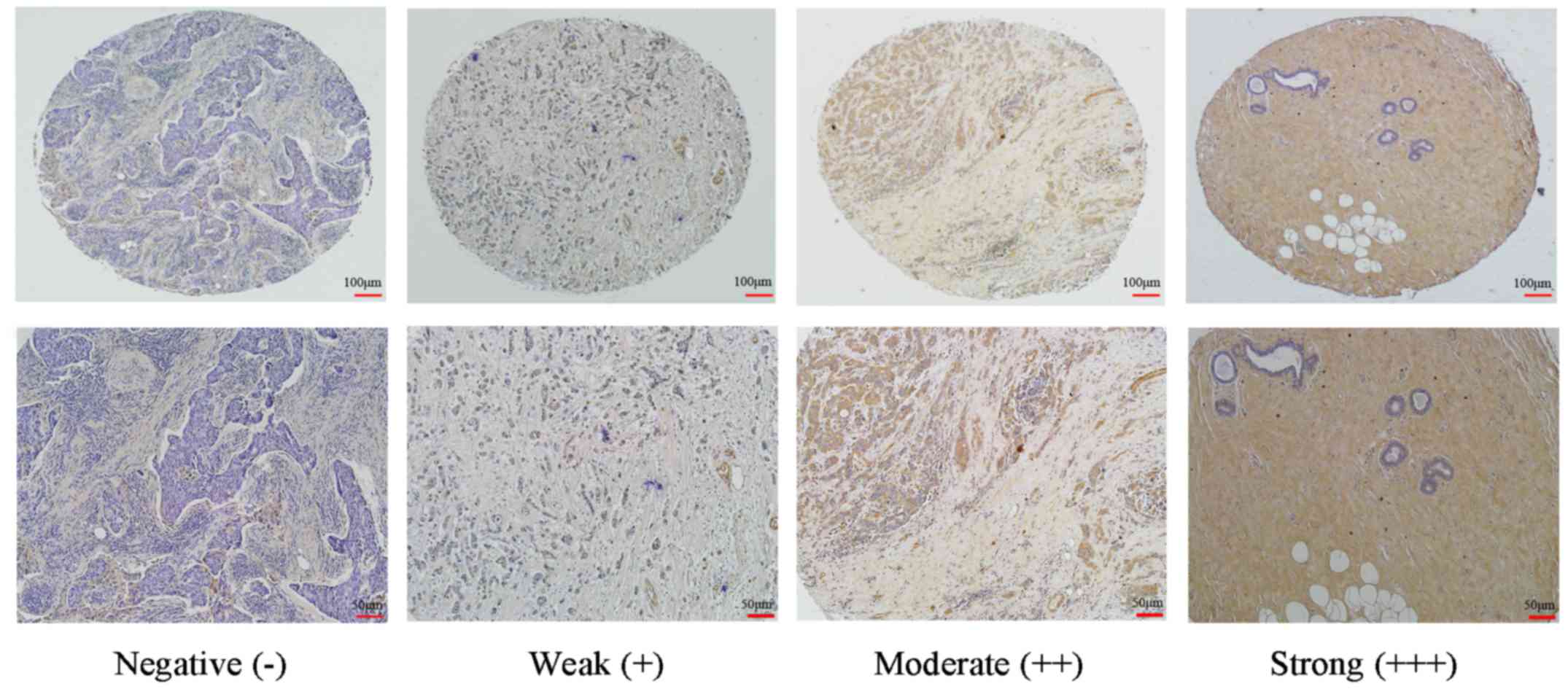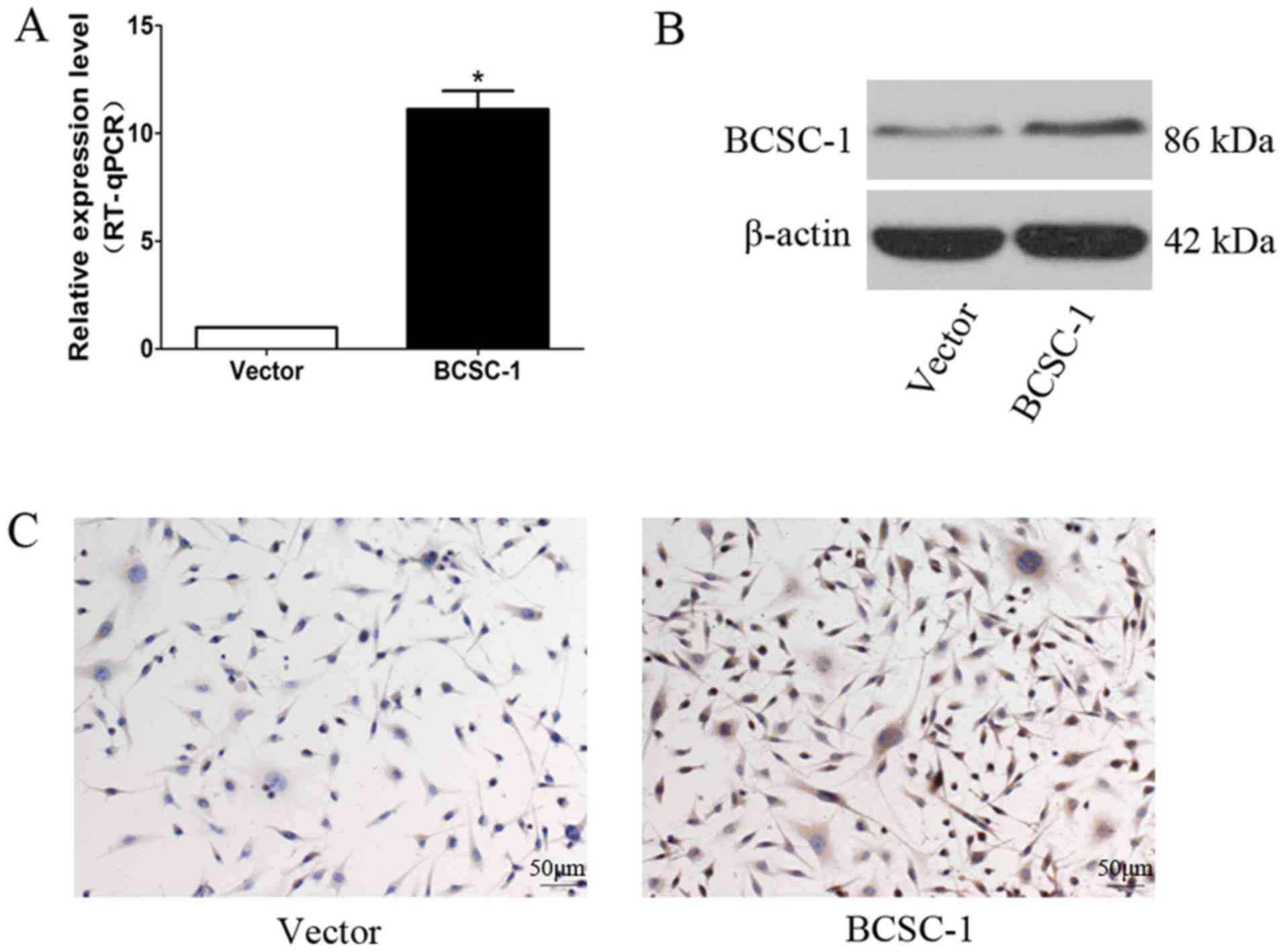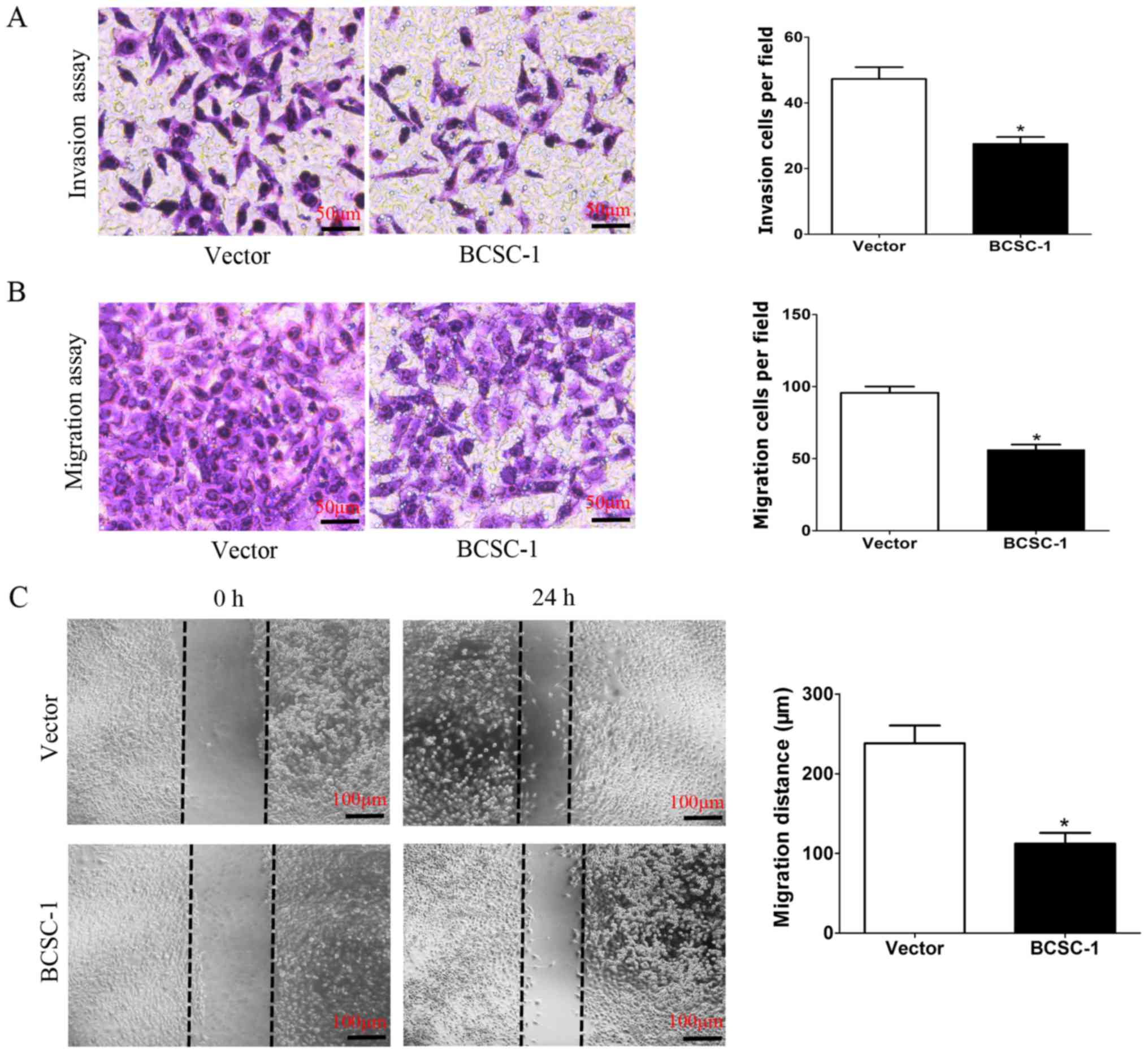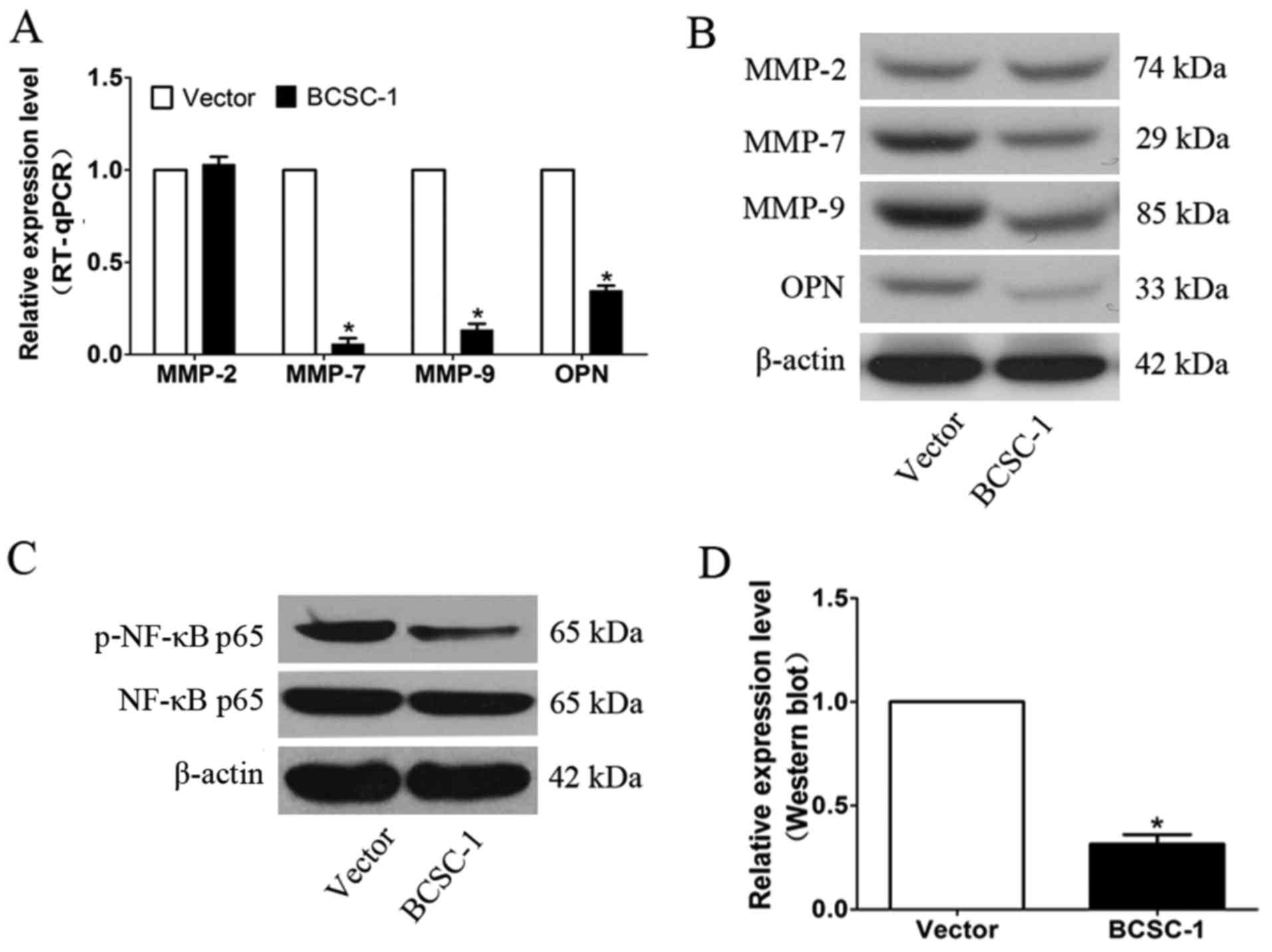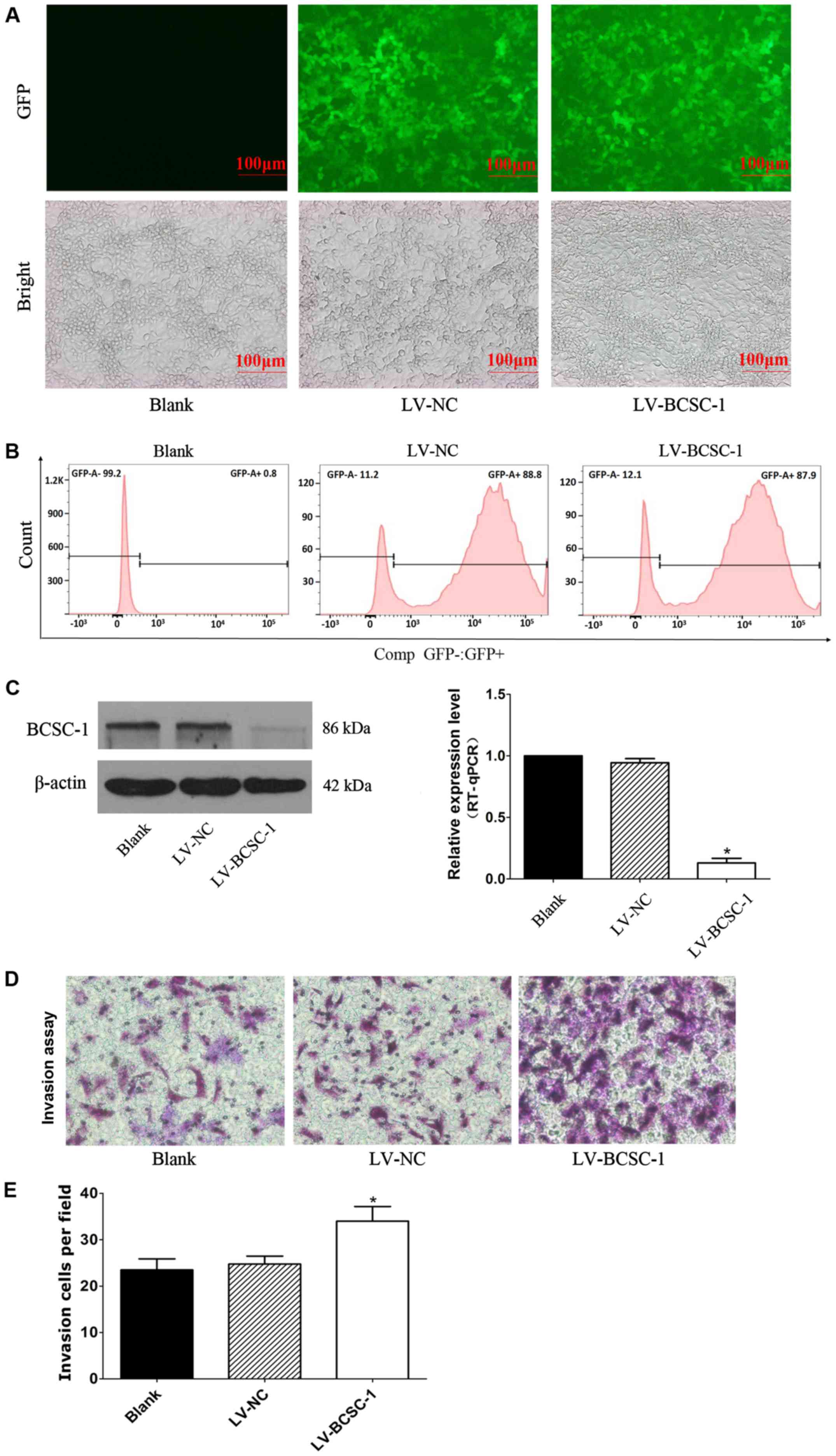|
1
|
Hong W and Dong E: The past, present and
future of breast cancer research in China. Cancer Lett. 351:1–5.
2014. View Article : Google Scholar : PubMed/NCBI
|
|
2
|
Organization WH: Breast cancer: Prevention
and control. World Health Stat Annu. 41:697–700. 2012.
|
|
3
|
Müller V, Fuxius S, Steffens CC,
Lerchenmüller C, Luhn B, Vehling-Kaiser U, Hurst U, Hahn LJ,
Soeling U, Wohlfarth T, et al: Quality of life under capecitabine
(Xeloda®) in patients with metastatic breast cancer:
Data from a german non-interventional surveillance study. Oncol Res
Treat. 37:748–755. 2014. View Article : Google Scholar
|
|
4
|
Lu J and Jin ML: Short-hairpin
RNA-mediated MTA2 silencing inhibits human breast cancer cell line
MDA-MB231 proliferation and metastasis. Asian Pac J Cancer Prev.
15:5577–5582. 2014. View Article : Google Scholar : PubMed/NCBI
|
|
5
|
Shanker M, Jin J, Branch CD, Miyamoto S,
Grimm EA, Roth JA and Ramesh R: Tumor suppressor gene-based
nanotherapy: From test tube to the clinic. J Drug Deliv.
2011:4658452011. View Article : Google Scholar : PubMed/NCBI
|
|
6
|
Martin ES, Cesari R, Pentimalli F, Yoder
K, Fishel R, Himelstein AL, Martin SE, Godwin AK, Negrini M and
Croce CM: The BCSC-1 locus at chromosome 11q23–q24 is a candidate
tumor suppressor gene. Proc Natl Acad Sci USA. 100:11517–11522.
2003. View Article : Google Scholar
|
|
7
|
Zhao CL, Yu WJ, Gao ZQ, Li WT, Gao W, Yang
WW, Feng WG and Ju JY: Association of BCSC-1 with human esophageal
squamous cell carcinoma. Neoplasma. 62:765–769. 2015. View Article : Google Scholar : PubMed/NCBI
|
|
8
|
Zhou YQ, Chen SL, Ju JY, Shen L, Liu Y,
Zhen S, Lv N, He ZG and Zhu LP: Tumor suppressor function of BCSC-1
in nasopharyngeal carcinoma. Cancer Sci. 100:1817–1822. 2009.
View Article : Google Scholar : PubMed/NCBI
|
|
9
|
Anghel SI, Correa-Rocha R, Budinska E,
Boligan KF, Abraham S, Colombetti S, Fontao L, Mariotti A, Rimoldi
D, Ghanem GE, et al: Breast cancer suppressor candidate-1 (BCSC-1)
is a melanoma tumor suppressor that down regulates MITF. Pigment
Cell Melanoma Res. 25:482–487. 2012. View Article : Google Scholar : PubMed/NCBI
|
|
10
|
Mali AV, Wagh UV, Hegde MV, Chandorkar SS,
Surve SV and Patole MV: In vitro anti-metastatic activity of
enterolactone, a mammalian lignan derived from flax lignan, and
down-regulation of matrix metalloproteinases in MCF-7 and MDA MB
231 cell lines. Indian J Cancer. 49:181–187. 2012. View Article : Google Scholar : PubMed/NCBI
|
|
11
|
Tong W, Wang Q, Sun D and Suo J: Curcumin
suppresses colon cancer cell invasion via AMPK-induced inhibition
of NF-κB, uPA activator and MMP9. Oncol Lett. 12:4139–4146. 2016.
View Article : Google Scholar : PubMed/NCBI
|
|
12
|
Hao C, Cui Y, Hu MU, Zhi X, Zhang L, Li W,
Wu W, Cheng S and Jiang WG: OPN-a splicing variant expression in
non-small cell lung cancer and its effects on the bone metastatic
abilities of lung cancer cells in vitro. Anticancer Res.
37:2245–2254. 2017. View Article : Google Scholar : PubMed/NCBI
|
|
13
|
Ishigamori R, Komiya M, Takasu S, Mutoh M,
Imai T and Takahashi M: Osteopontin deficiency suppresses
intestinal tumor development in Apc-deficient min mice. Int J Mol
Sci. 18:182017. View Article : Google Scholar
|
|
14
|
Livak KJ and Schmittgen TD: Analysis of
relative gene expression data using real-time quantitative PCR and
the 2(-Delta Delta C(T)) method. Methods. 25:402–408. 2001.
View Article : Google Scholar
|
|
15
|
Xu YM, Wang HJ, Chen F, Guo WH, Wang YY,
Li HY, Tang JH, Ding Y, Shen YC, Li M, et al: HRD1 suppresses the
growth and metastasis of breast cancer cells by promoting IGF-1R
degradation. Oncotarget. 6:42854–42867. 2015. View Article : Google Scholar : PubMed/NCBI
|
|
16
|
Ding F, Wang J, Zhu G, Zhao H, Wu G and
Chen L: Osteopontin stimulates matrix metalloproteinase expression
through the nuclear factor-κB signaling pathway in rat
temporomandibular joint and condylar chondrocytes. Am J Transl Res.
9:316–329. 2017.
|
|
17
|
Ahn KS and Aggarwal BB: Transcription
factor NF-kappaB: A sensor for smoke and stress signals. Ann NY
Acad Sci. 1056:218–233. 2005. View Article : Google Scholar
|
|
18
|
Shishodia S and Aggarwal BB: Nuclear
factor-kappaB activation: A question of life or death. J Biochem
Mol Biol. 35:28–40. 2002.
|
|
19
|
Lin A and Karin M: NF-kappaB in cancer: A
marked target. Semin Cancer Biol. 13:107–114. 2003. View Article : Google Scholar : PubMed/NCBI
|
|
20
|
Uetsuka H, Haisa M, Kimura M, Gunduz M,
Kaneda Y, Ohkawa T, Takaoka M, Murata T, Nobuhisa T, Yamatsuji T,
et al: Inhibition of inducible NF-kappaB activity reduces
chemoresistance to 5-fluorouracil in human stomach cancer cell
line. Exp Cell Res. 289:27–35. 2003. View Article : Google Scholar : PubMed/NCBI
|
|
21
|
Tang X, Liu D, Shishodia S, Ozburn N,
Behrens C, Lee JJ, Hong WK, Aggarwal BB and Wistuba II: Nuclear
factor-kappaB (NF-kappaB) is frequently expressed in lung cancer
and preneoplastic lesions. Cancer. 107:2637–2646. 2006. View Article : Google Scholar
|
|
22
|
Hu Y, Guo R, Wei J, Zhou Y, Ji W, Liu J,
Zhi X and Zhang J: Effects of PI3K inhibitor NVP-BKM120 on
overcoming drug resistance and eliminating cancer stem cells in
human breast cancer cells. Cell Death Dis. 6:e20202015. View Article : Google Scholar : PubMed/NCBI
|
|
23
|
Bharti AC and Aggarwal BB: Nuclear
factor-kappa B and cancer: Its role in prevention and therapy.
Biochem Pharmacol. 64:883–888. 2002. View Article : Google Scholar : PubMed/NCBI
|
|
24
|
Ashikawa K, Majumdar S, Banerjee S, Bharti
AC, Shishodia S and Aggarwal BB: Piceatannol inhibits TNF-induced
NF-kappaB activation and NF-kappaB-mediated gene expression through
suppression of IkappaBalpha kinase and p65 phosphorylation. J
Immunol. 169:6490–6497. 2002. View Article : Google Scholar
|
|
25
|
Sethi G, Sung B and Aggarwal BB: Nuclear
factor-kappaB activation: From bench to bedside. Exp Biol Med
(Maywood). 233:21–31. 2008. View Article : Google Scholar
|
|
26
|
Ahn KS, Sethi G and Aggarwal BB: Nuclear
factor-kappa B: From clone to clinic. Curr Mol Med. 7:619–637.
2007. View Article : Google Scholar : PubMed/NCBI
|
|
27
|
Lee CH, Jeon YT, Kim SH and Song YS:
NF-kappaB as a potential molecular target for cancer therapy.
Biofactors. 29:19–35. 2007. View Article : Google Scholar : PubMed/NCBI
|
|
28
|
Abbas A, Aukrust P, Russell D,
Krohg-Sørensen K, Almås T, Bundgaard D, Bjerkeli V, Sagen EL,
Michelsen AE, Dahl TB, et al: Matrix metalloproteinase 7 is
associated with symptomatic lesions and adverse events in patients
with carotid atherosclerosis. PLoS One. 9:e849352014. View Article : Google Scholar : PubMed/NCBI
|
|
29
|
Cuadriello EF, Fernández-Guinea Ó, Eiró N,
González LO, Junquera S and Vizoso FJ: Relationship between
morphological features and kinetic patterns of enhancement of the
dynamic breast magnetic resonance imaging and tumor expression of
metalloproteases and their inhibitors in invasive breast cancer.
Magn Reson Imaging. 34:1107–1113. 2016. View Article : Google Scholar : PubMed/NCBI
|
|
30
|
Makhoul I, Todorova VK, Siegel ER,
Erickson SW, Dhakal I, Raj VR, Lee JY, Orloff MS, Griffin RJ,
Henry-Tillman RS, et al: Germline genetic variants in TEK, ANGPT1,
ANGPT2, MMP9, FGF2 and VEGFA are associated with pathologic
complete response to bevacizumab in breast cancer patients. PLoS
One. 12:e01685502017. View Article : Google Scholar : PubMed/NCBI
|
|
31
|
Liu D, Guo H, Li Y, Xu X, Yang K and Bai
Y: Association between polymorphisms in the promoter regions of
matrix metalloproteinases (MMPs) and risk of cancer metastasis: A
meta-analysis. PLoS One. 7:e312512012. View Article : Google Scholar : PubMed/NCBI
|
|
32
|
Xiao C, Wu CH and Hu HZ: LncRNA UCA1
promotes epithelial-mesenchymal transition (EMT) of breast cancer
cells via enhancing Wnt/beta-catenin signaling pathway. Eur Rev Med
Pharmacol Sci. 20:2819–2824. 2016.PubMed/NCBI
|
|
33
|
Beeghly-Fadiel A, Shu XO, Long J, Li C,
Cai Q, Cai H, Gao YT and Zheng W: Genetic polymorphisms in the
MMP-7 gene and breast cancer survival. Int J Cancer. 124:208–214.
2009. View Article : Google Scholar :
|
|
34
|
Mon NN, Senga T and Ito S: Interleukin-1β
activates focal adhesion kinase and Src to induce matrix
metalloproteinase-9 production and invasion of MCF-7 breast cancer
cells. Oncol Lett. 13:955–960. 2017. View Article : Google Scholar : PubMed/NCBI
|
|
35
|
Hwang JK, Yu HN, Noh EM, Kim JM, Hong OY,
Youn HJ, Jung SH, Kwon KB, Kim JS and Lee YR: DHA blocks
TPA-induced cell invasion by inhibiting MMP-9 expression via
suppression of the PPAR-γ/NF-κB pathway in MCF-7 cells. Oncol Lett.
13:243–249. 2017. View Article : Google Scholar : PubMed/NCBI
|
|
36
|
Chung TW, Choi H, Lee JM, Ha SH, Kwak CH,
Abekura F, Park JY, Chang YC, Ha KT, Cho SH, et al: Oldenlandia
diffusa suppresses metastatic potential through inhibiting matrix
metal-loproteinase-9 and intercellular adhesion molecule-1
expression via p38 and ERK1/2 MAPK pathways and induces apoptosis
in human breast cancer MCF-7 cells. J Ethnopharmacol. 195:309–317.
2017. View Article : Google Scholar
|
|
37
|
Mohammadzadeh R, Saeid Harouyan M and Ale
Taha SM: Silencing of bach1 gene by small interfering RNA-mediation
regulates invasive and expression level of miR-203, miR-145, matrix
metalloproteinase-9, and CXCR4 receptor in MDA-MB-468 breast cancer
cells. Tumour Biol. 39:10104283176959252017. View Article : Google Scholar : PubMed/NCBI
|
|
38
|
Kim JM, Noh EM, Kim HR, Kim MS, Song HK,
Lee M, Yang SH, Lee GS, Moon HC, Kwon KB, et al: Suppression of
TPA-induced cancer cell invasion by Peucedanum japonicum Thunb.
extract through the inhibition of PKCα/NF-κB-dependent MMP-9
expression in MCF-7 cells. Int J Mol Med. 37:108–114. 2016.
View Article : Google Scholar : PubMed/NCBI
|
|
39
|
Matsumoto G, Namekawa J, Muta M, Nakamura
T, Bando H, Tohyama K, Toi M and Umezawa K: Targeting of nuclear
factor kappaB Pathways by dehydroxymethylepoxyquinomicin, a novel
inhibitor of breast carcinomas: Antitumor and antiangiogenic
potential in vivo. Clin Cancer Res. 11:1287–1293. 2005.PubMed/NCBI
|
|
40
|
Yu H, Guo C, Feng B, Liu J, Chen X, Wang
D, Teng L, Li Y, Yin Q, Zhang Z, et al: Triple-layered
pH-responsive micelleplexes loaded with siRNA and cisplatin prodrug
for NF-kappa B targeted treatment of metastatic breast cancer.
Theranostics. 6:14–27. 2016. View Article : Google Scholar : PubMed/NCBI
|
|
41
|
Gutsche K, Randi EB, Blank V, Fink D,
Wenger RH, Leo C and Scholz CC: Intermittent hypoxia confers
pro-metastatic gene expression selectively through NF-κB in
inflammatory breast cancer cells. Free Radic Biol Med. 101:129–142.
2016. View Article : Google Scholar : PubMed/NCBI
|
|
42
|
Senger DR, Wirth DF and Hynes RO:
Transformed mammalian cells secrete specific proteins and
phosphoproteins. Cell. 16:885–893. 1979. View Article : Google Scholar : PubMed/NCBI
|
|
43
|
Bao LH, Sakaguchi H, Fujimoto J and Tamaya
T: Osteopontin in metastatic lesions as a prognostic marker in
ovarian cancers. J Biomed Sci. 14:373–381. 2007. View Article : Google Scholar : PubMed/NCBI
|
|
44
|
Coppola D, Szabo M, Boulware D, Muraca P,
Alsarraj M, Chambers AF and Yeatman TJ: Correlation of osteopontin
protein expression and pathological stage across a wide variety of
tumor histologies. Clin Cancer Res. 10:184–190. 2004. View Article : Google Scholar : PubMed/NCBI
|
|
45
|
Brown LF, Papadopoulos-Sergiou A, Berse B,
Manseau EJ, Tognazzi K, Perruzzi CA, Dvorak HF and Senger DR:
Osteopontin expression and distribution in human carcinomas. Am J
Pathol. 145:610–623. 1994.PubMed/NCBI
|
|
46
|
Denhardt DT, Mistretta D, Chambers AF,
Krishna S, Porter JF, Raghuram S and Rittling SR: Transcriptional
regulation of osteopontin and the metastatic phenotype: Evidence
for a Ras-activated enhancer in the human OPN promoter. Clin Exp
Metastasis. 20:77–84. 2003. View Article : Google Scholar : PubMed/NCBI
|
|
47
|
Ito T, Hashimoto Y, Tanaka E, Kan T,
Tsunoda S, Sato F, Higashiyama M, Okumura T and Shimada Y: An
inducible short-hairpin RNA vector against osteopontin reduces
metastatic potential of human esophageal squamous cell carcinoma in
vitro and in vivo. Clin Cancer Res. 12:1308–1316. 2006. View Article : Google Scholar : PubMed/NCBI
|
|
48
|
Psyrri A, Kalogeras KT, Wirtz RM,
Kouvatseas G, Karayannopoulou G, Goussia A, Zagouri F, Veltrup E,
Timotheadou E, Gogas H, et al: Association of osteopontin with
specific prognostic factors and survival in adjuvant breast cancer
trials of the Hellenic Cooperative Oncology Group. J Transl Med.
15:302017. View Article : Google Scholar : PubMed/NCBI
|
|
49
|
Xu YY, Zhang YY, Lu WF, Mi YJ and Chen YQ:
Prognostic value of osteopontin expression in breast cancer: A
meta-analysis. Mol Clin Oncol. 3:357–362. 2015. View Article : Google Scholar : PubMed/NCBI
|
|
50
|
Hurst DR, Xie Y, Vaidya KS, Mehta A, Moore
BP, Accavitti-Loper MA, Samant RS, Saxena R, Silveira AC and Welch
DR: Alterations of BRMS1-ARID4A interaction modify gene expression
but still suppress metastasis in human breast cancer cells. J Biol
Chem. 283:7438–7444. 2008. View Article : Google Scholar : PubMed/NCBI
|















